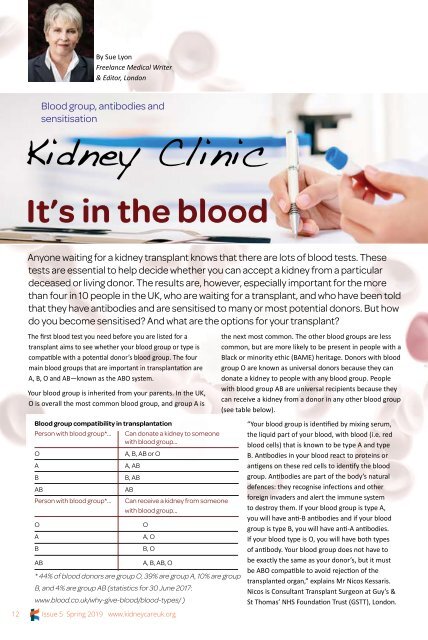Kidney Matters - Issue 5, Spring 2019
You also want an ePaper? Increase the reach of your titles
YUMPU automatically turns print PDFs into web optimized ePapers that Google loves.
By Sue Lyon<br />
Freelance Medical Writer<br />
& Editor, London<br />
Blood group, antibodies and<br />
sensitisation<br />
<strong>Kidney</strong> Clinic<br />
It’s in the blood<br />
Anyone waiting for a kidney transplant knows that there are lots of blood tests. These<br />
tests are essential to help decide whether you can accept a kidney from a particular<br />
deceased or living donor. The results are, however, especially important for the more<br />
than four in 10 people in the UK, who are waiting for a transplant, and who have been told<br />
that they have antibodies and are sensitised to many or most potential donors. But how<br />
do you become sensitised? And what are the options for your transplant?<br />
The first blood test you need before you are listed for a<br />
transplant aims to see whether your blood group or type is<br />
compatible with a potential donor’s blood group. The four<br />
main blood groups that are important in transplantation are<br />
A, B, O and AB—known as the ABO system.<br />
Your blood group is inherited from your parents. In the UK,<br />
O is overall the most common blood group, and group A is<br />
the next most common. The other blood groups are less<br />
common, but are more likely to be present in people with a<br />
Black or minority ethic (BAME) heritage. Donors with blood<br />
group O are known as universal donors because they can<br />
donate a kidney to people with any blood group. People<br />
with blood group AB are universal recipients because they<br />
can receive a kidney from a donor in any other blood group<br />
(see table below).<br />
Blood group compatibility in transplantation<br />
Person with blood group*… Can donate a kidney to someone<br />
with blood group…<br />
O<br />
A, B, AB or O<br />
A<br />
A, AB<br />
B<br />
B, AB<br />
AB<br />
AB<br />
Person with blood group*… Can receive a kidney from someone<br />
with blood group…<br />
O<br />
A<br />
B<br />
AB<br />
O<br />
A, O<br />
B, O<br />
A, B, AB, O<br />
* 44% of blood donors are group O, 39% are group A, 10% are group<br />
B, and 4% are group AB (statistics for 30 June 2017:<br />
www.blood.co.uk/why-give-blood/blood-types/ )<br />
“Your blood group is identified by mixing serum,<br />
the liquid part of your blood, with blood (i.e. red<br />
blood cells) that is known to be type A and type<br />
B. Antibodies in your blood react to proteins or<br />
antigens on these red cells to identify the blood<br />
group. Antibodies are part of the body’s natural<br />
defences: they recognise infections and other<br />
foreign invaders and alert the immune system<br />
to destroy them. If your blood group is type A,<br />
you will have anti-B antibodies and if your blood<br />
group is type B, you will have anti-A antibodies.<br />
If your blood type is O, you will have both types<br />
of antibody. Your blood group does not have to<br />
be exactly the same as your donor’s, but it must<br />
be ABO compatible to avoid rejection of the<br />
transplanted organ,” explains Mr Nicos Kessaris.<br />
Nicos is Consultant Transplant Surgeon at Guy’s &<br />
St Thomas’ NHS Foundation Trust (GSTT), London.<br />
12<br />
<strong>Issue</strong> 5 <strong>Spring</strong> <strong>2019</strong> www.kidneycareuk.org


















